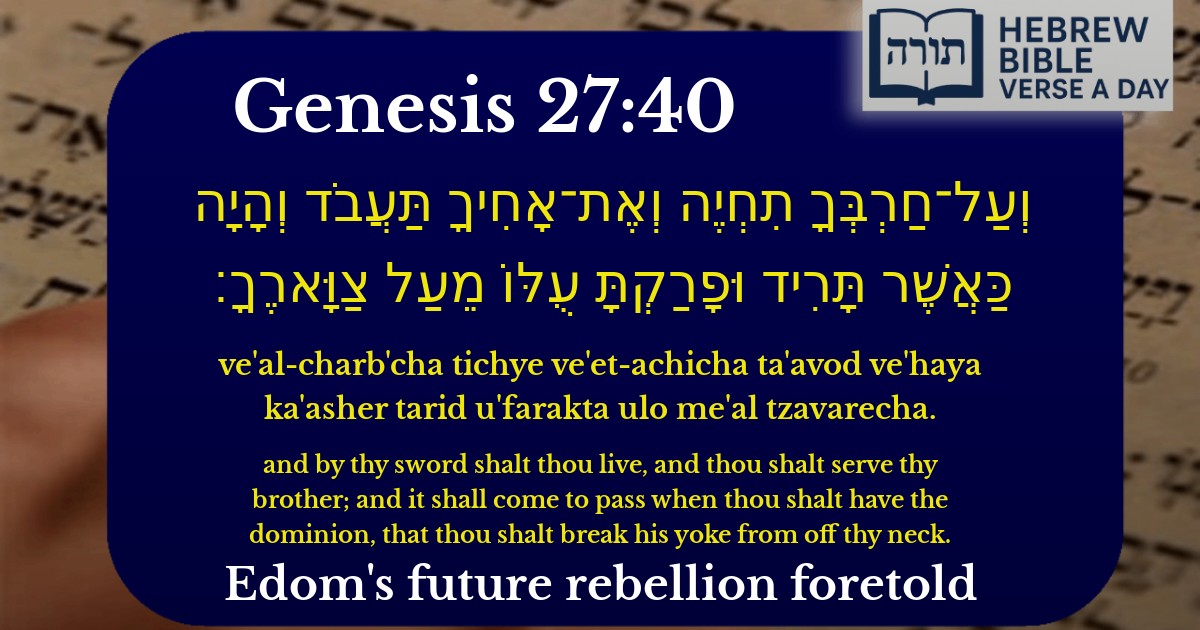Join Our Newsletter To Be Informed When New Videos Are Posted
Join the thousands of fellow Studends who rely on our videos to learn how to read the bible in Hebrew for free!
Hebrew Text
וְעַל־חַרְבְּךָ תִחְיֶה וְאֶת־אָחִיךָ תַּעֲבֹד וְהָיָה כַּאֲשֶׁר תָּרִיד וּפָרַקְתָּ עֻלּוֹ מֵעַל צַוָּארֶךָ׃
English Translation
and by thy sword shalt thou live, and thou shalt serve thy brother; and it shall come to pass when thou shalt have the dominion, that thou shalt break his yoke from off thy neck.
Transliteration
Ve'al-charb'cha tichye ve'et-achicha ta'avod ve'haya ka'asher tarid u'farakta ulo me'al tzavarecha.
Hebrew Leining Text
וְעַל־חַרְבְּךָ֣ תִֽחְיֶ֔ה וְאֶת־אָחִ֖יךָ תַּעֲבֹ֑ד וְהָיָה֙ כַּאֲשֶׁ֣ר תָּרִ֔יד וּפָרַקְתָּ֥ עֻלּ֖וֹ מֵעַ֥ל צַוָּארֶֽךָ׃
וְעַל־חַרְבְּךָ֣ תִֽחְיֶ֔ה וְאֶת־אָחִ֖יךָ תַּעֲבֹ֑ד וְהָיָה֙ כַּאֲשֶׁ֣ר תָּרִ֔יד וּפָרַקְתָּ֥ עֻלּ֖וֹ מֵעַ֥ל צַוָּארֶֽךָ׃
🎵 Listen to leining
Parasha Commentary
📚 Talmud Citations
This verse is quoted in the Talmud.
📖 Berakhot 7b
The verse is referenced in a discussion about divine justice and the fate of Esau and Jacob, illustrating the complex relationship between the brothers as foretold in Genesis.
📖 Avodah Zarah 11b
Cited in a broader discussion about the interactions between Israel and other nations, reflecting on the historical and eschatological dimensions of the verse's prophecy.


Context of the Verse
This verse (Genesis 27:40) is part of Yitzchak's blessing to his son Eisav after realizing that Yaakov had received the primary blessing intended for Eisav. The verse reflects the complex relationship between Yaakov and Eisav, symbolizing the future dynamics between their descendants—the Jewish people (Yaakov) and the nation of Edom (Eisav).
Explanation of the Verse
The verse contains three key components:
Symbolism and Future Redemption
The Malbim emphasizes that this verse outlines the historical struggle between Yaakov and Eisav. The "yoke" represents periods of Jewish exile under Edomite (Roman/Christian) domination, but the eventual "breaking" of the yoke signifies the ultimate redemption when the Jewish people will be freed from oppression. The Kli Yakar connects this to the idea that Eisav's power is temporary, while Yaakov's spiritual legacy is eternal.
Halachic and Ethical Implications
The Rambam (Hilchot Melachim 6:4) derives from this verse that Jews are permitted to defend themselves against hostile nations like Edom. However, the Netziv (Ha'amek Davar) cautions that reliance on the sword (like Eisav) is not the Jewish ideal; rather, our strength comes from Torah and divine providence.